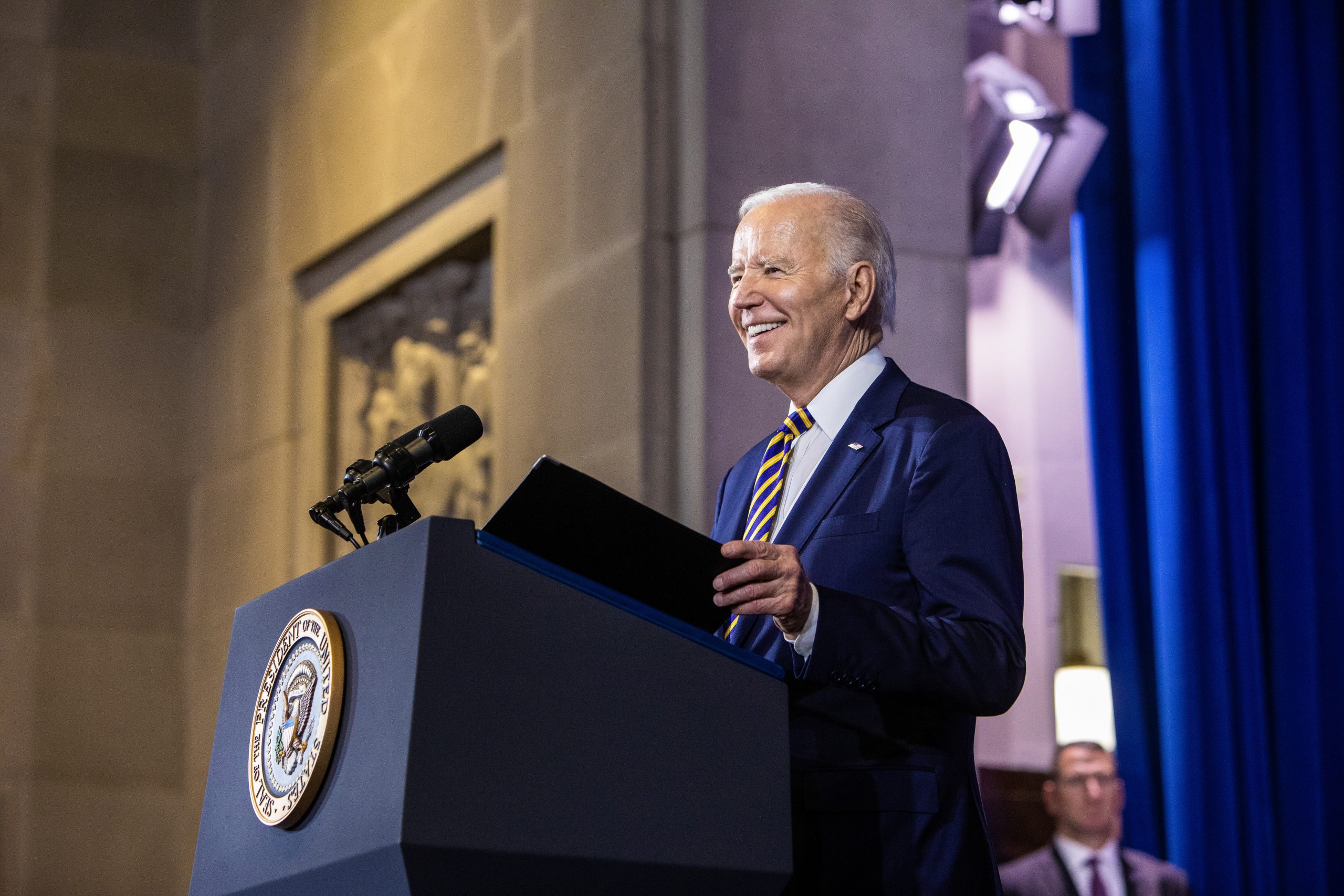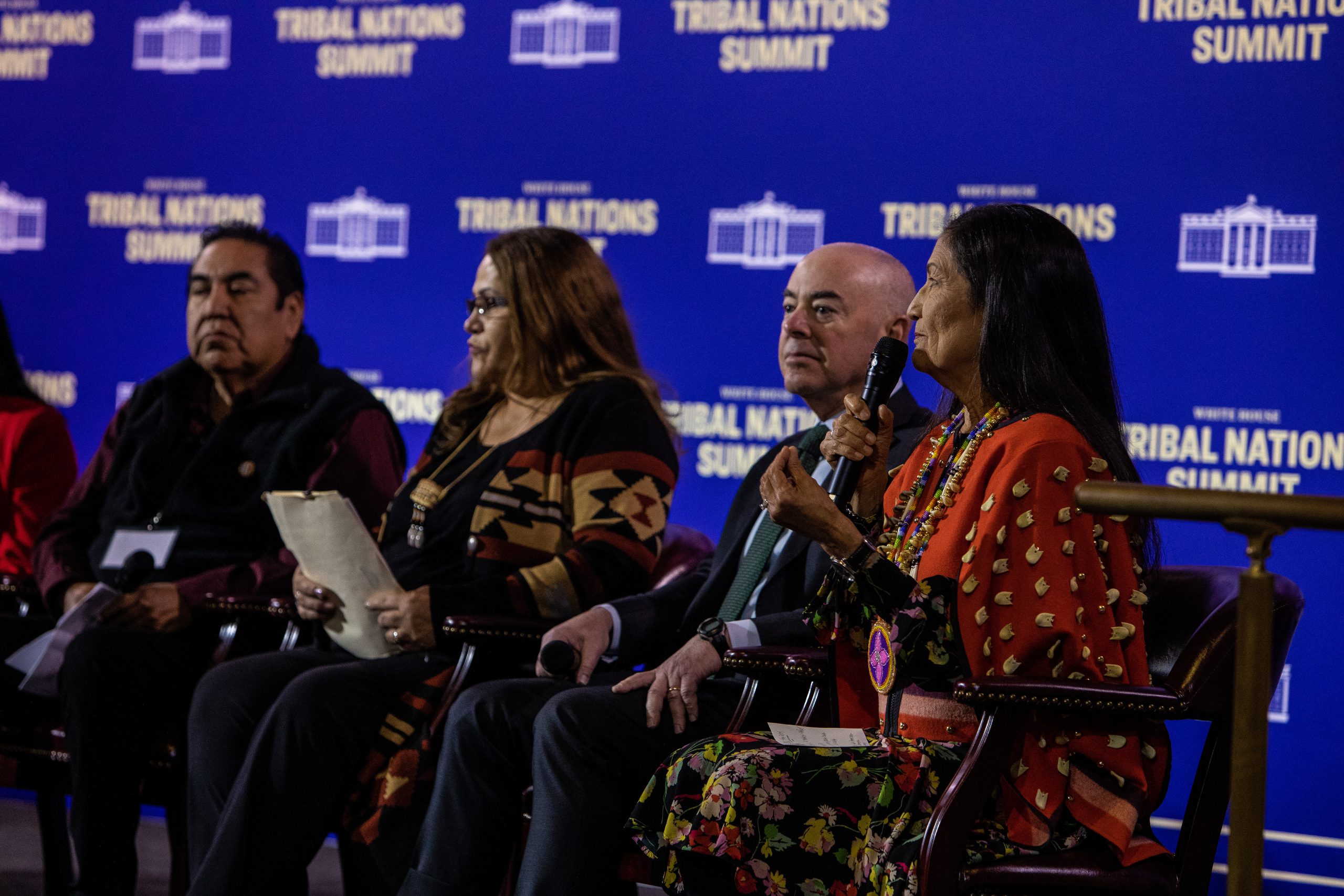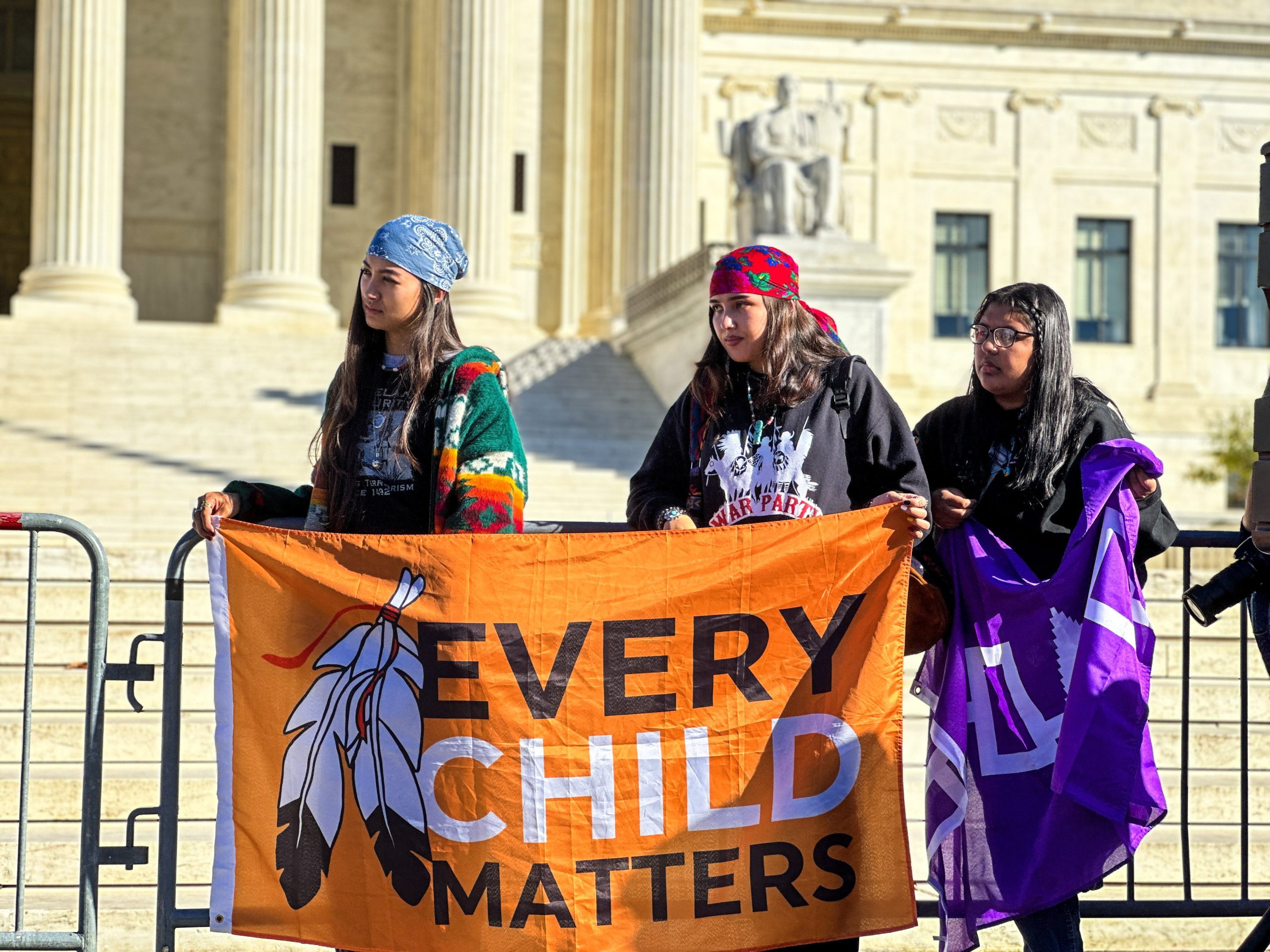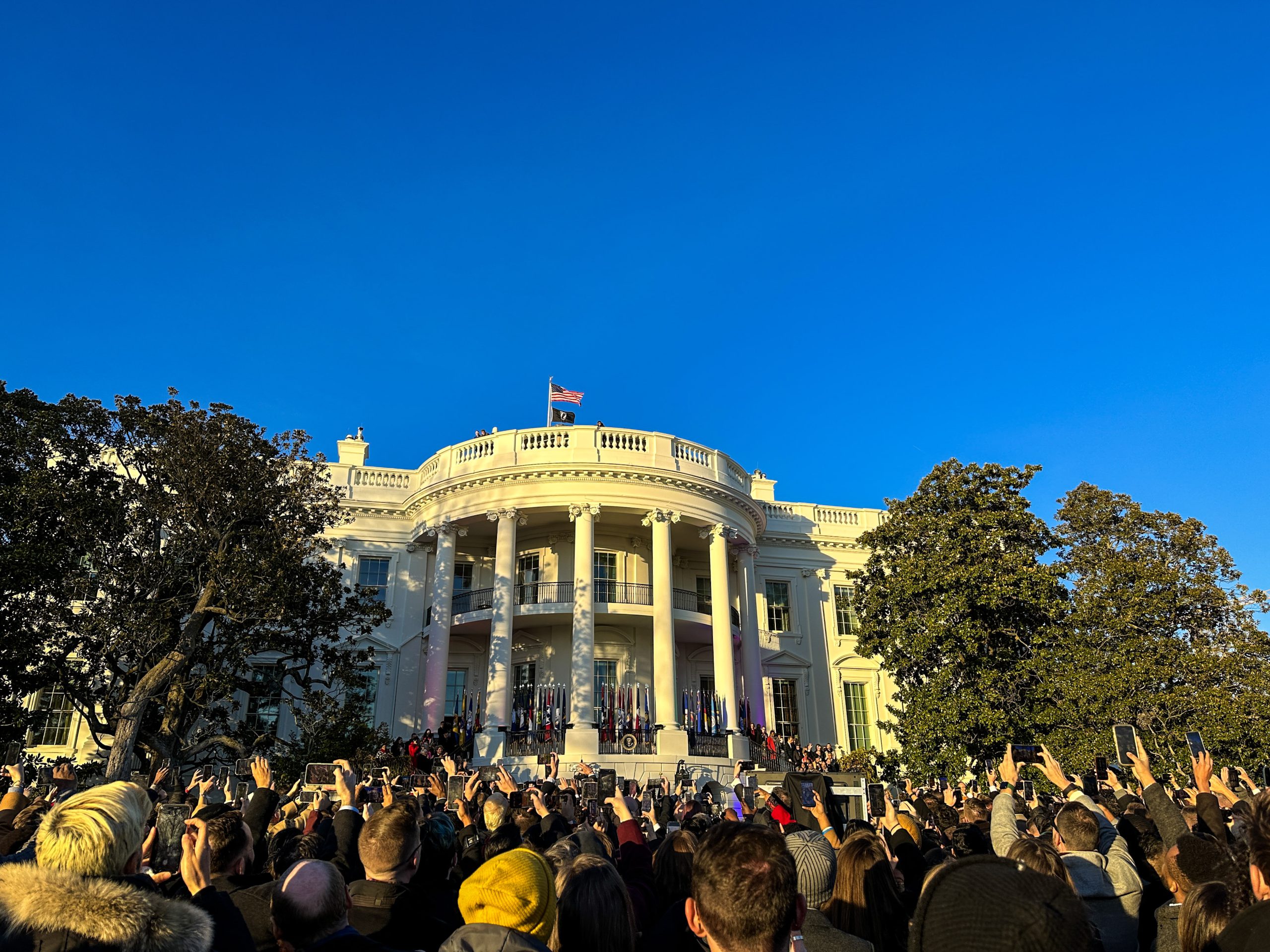Indianz.Com >
News > ‘Empower tribal nations’: Indian Country looks to White House for support
 President Joe Biden addresses the White House Tribal Nations Summit at the Department of the Interior in Washington, D.C., on November 30, 2022. Photo: U.S. DOI
President Joe Biden addresses the White House Tribal Nations Summit at the Department of the Interior in Washington, D.C., on November 30, 2022. Photo: U.S. DOI
‘Empower tribal nations’
Indian Country looks to White House for support amid negative court rulings
Wednesday, December 14, 2022
By Acee Agoyo
Indianz.Com
WASHINGTON, D.C. — With one negative ruling on the books and a potentially devastating one on the way, tribal leaders continue to look to the Biden administration to address the impacts of the
U.S. Supreme Court.
At the end of June, the high court ruled that
state governments can exercise jurisdiction in Indian Country — even without tribal consent or involvement. The decision in
Oklahoma v. Castro-Huerta has been called an
“attack” on the sovereign rights of tribal nations.
Then in early November, the justices heard
more than three hours of arguments in a case known as
Haaland v. Brackeen. The highly-contentious dispute has tribes worried not only about the fate of the
Indian Child Welfare Act (ICWA) but also about the very basis of their government-to-government relationship with the United States, one that is rooted in sovereignty.
“There’s two things that concern me,”
Chairman Kasey Velasquez of the
White Mountain Apache Tribe said at the White House Tribal Nations Summit earlier this month.
“Number one is the
Castro situation and also ICWA,” Velasquez said of the two Supreme Court cases.
“Right now, as the leader of the White Mountain Apache Tribe, I feel that our sovereign immunity is being slowly taken apart,” the chairman said during a
discussion on public safety and justice on December 1, the second day of the White House meeting.
Indianz.Com Audio: Armchair Conversation with Tribal Leaders: Public Safety & Justice@White House Tribal Nations Summit
Velasquez wasn’t the only one to bring up the Supreme Court at the summit, which drew speeches from
President Joe Biden and
Vice President Kamala Harris on the opening day of the event.
Castro-Huerta and
Brackeen were on the minds of many as they asked the White House to help support efforts to respect and strengthen their sovereign rights.
“Give us that power — empower tribal nations,”
Principal Chief David Hill of the
Muscogee Nation said in seeking support for legislation that would
improve public safety in Indian Country.
The Biden administration has heard the concerns about the highest court in the land. In September, the
Department of Justice (DOJ) and the
Department of the Interior (DOI) held listening sessions to solicit input about
Castro-Huerta and its impacts on tribal safety.
“A recent Supreme Court decision has really corroded some of this notion, of the fundamental sovereign right of tribes to determine the appropriate means for securing public safety for their people, and to govern their lands,” said
Associate Attorney General Vanita Gupta, the third highest-ranking official at DOJ. “And that is the
Castro-Huerta decision.”
 Tribal leaders and federal officials take part in a discussion about public safety and justice during the White House Tribal Summit in Washington, D.C., on November 29, 2022. Photo: U.S. Department of the Interior
Tribal leaders and federal officials take part in a discussion about public safety and justice during the White House Tribal Summit in Washington, D.C., on November 29, 2022. Photo: U.S. Department of the Interior
Ahead of the White House Tribal Nations Summit, which was held in person for the first time since being revived by President Biden last year, DOJ and DOI released a
summary report that confirms the fears about tribal rights being eroded and addresses the potential for a legislative response.
But so far, the administration hasn’t committed to a path forward despite the
National Congress of American Indians, the largest inter-tribal advocacy group, calling for legislation at the federal level through the resolution cited by Chief Hill.
“We’ve been listening to many of you the last few weeks to understand what the operational and legal impact is and we are continuing to evaluate how we might be able to better clarify what issues are presented, and to ensure that we can do everything we can to honor our treaty and trust responsibilities,” Gupta said of the administration’s approach to
Castro-Huerta.
A decision in
Brackeen isn’t expected until sometime next year. But tribal leaders
fear that the Supreme Court, with six of the nine justices having been chosen by Republican presidents, is already stacked against Indian Country’s interests.
“I’m telling you — spending three hours in this courtroom with the highest court of this land, the Supreme Court, and [to] sit here and still feel that they do not get us,”
NCAI President Fawn Sharp said
after the hearing in the case on November 9.
“Three hours of agonizing argument, agonizing questions, where they don’t understand the basic concept that we have inherent sovereignty, and we have inherent rights to the future of every single Native child,” said Sharp, who also serves as vice president of the
Quinault Nation, one of the tribes that has been involved in defending ICWA as part of the case.
 Native youth hold a banner reading “Every Child Matters” during a rally at the U.S. Supreme Court on November 9, 2022. Photo by Indianz.Com (CC BY-NC-SA 4.0)
Native youth hold a banner reading “Every Child Matters” during a rally at the U.S. Supreme Court on November 9, 2022. Photo by Indianz.Com (CC BY-NC-SA 4.0)
Congress enacted ICWA in 1978 to address the high rates of Indian children being taken from their families and their communities — all without tribal consent. The statute is based on the political and legal relationship between tribes and the federal government but opponents are urging the Supreme Court to invalidate the law by disregarding hundreds of years of policy.
Should the conservative leaning majority of the high school accept the premise advanced by opponents of ICWA, many of whom are funded by right-wing groups, tribes are worried that a slew of other beneficial laws could be overturned as well.
“The Constitution allows Congress to legislate regarding tribes and the affairs of citizens of Indian nations, and that constitutional principle has led not only to the Indian Child Welfare Act, which stemmed the dispossession of our children from tribal land, but a range of laws relating to tribal sovereignty,”
Principal Chief Chuck Hoskin, Jr. of the
Cherokee Nation said on the
steps of the Supreme Court last month.
Like the Quinault Nation, the Cherokee Nation has been part of
Brackeen since its
inception five years ago by non-Indian plaintiffs and Republican state legal officials. The Biden administration has not publicly said what might happen should ICWA be invalidated in any form.
“The Justice Department was vigorously defending ICWA in the Supreme Court,” Gupta from DOJ said at the White House Tribal Nations Summit. “We will do all that we can but we’re gonna need to do this as a partnership.”
 A crowd of thousands welcomes the arrival of marriage equality plaintiffs at a ceremony for the signing of the Respect the Marriage Act at the White House on December 13, 2022. Photo by Indianz.Com (CC BY-NC-SA 4.0)
A crowd of thousands welcomes the arrival of marriage equality plaintiffs at a ceremony for the signing of the Respect the Marriage Act at the White House on December 13, 2022. Photo by Indianz.Com (CC BY-NC-SA 4.0)
Addressing a negative Supreme Court decision isn’t easy — but Democrats in the 117th Congress accomplished a political feat with final passage of
H.R.8404, the
Respect for Marriage Act, last week. The bill, which President Biden signed during a large ceremony at the White House on Tuesday, ensures that
same-sex and inter-racial marriages remain valid under federal law.
“It’s one thing for the Supreme Court to rule on a case, but it’s another thing entirely for elected representatives of the people to take a vote on the floor of the United States Congress and say loudly and clearly: Love is love,” Biden said on the South Lawn before a crowd of thousands, including many Americans who had to resort to litigation because their marriages weren’t recognized under federal or state law.
“Right is right. Justice is justice,” the president said.
While Biden noted that the bill was first introduced a decade ago, Vice President Harris said passage of the Respect for Marriage Act was made more urgent by a more recent development.
Days before the
Oklahoma v. Castro-Huerta decision on June 29, the Supreme Court overturned decades of precedent by
denying women the constitutional right to an abortion.
“The
Dobbs decision reminds us that fundamental rights are interconnected, including the right to marry who you love, the right to access contraception, and the right to make decisions about your own body,” Harris said of the June 24 ruling in
Dobbs v. Jackson Women’s Health Organization.
But with Democrats losing control of the
U.S. House of Representatives in the next session of Congress, President Biden and his party will be operating under a changed political atmosphere in 2023. All of the
“Nays” on the Respect the Marriage Act came from Republicans in the chamber.
The three Republicans who are also tribal citizens —
Rep. Tom Cole (R-Oklahoma), a citizen of the Chickasaw Nation,
Rep. Markwayne Mullin (R-Oklahoma), a citizen of the Cherokee Nation, and
Rep. Yvette Herrell (R-New Mexico), also Chickasaw — voted against passage of the Respect the Marriage Act.
All Democrats, including
Rep. Sharice Davids (D-Kansas), a citizen of the Ho-Chunk Nation who attended the White House ceremony on Tuesday, were in support.
The
U.S. Senate will remain under Democratic control in the 118th Congress — though just barely. Democrats have secured 50 seats but newly declared Independent,
Sen. Krysten Sinema of Arizona, will continue to caucus with the party, thus giving them a majority. Vice President Harris, in her role as president of the Senate, can also provide a crucial vote.
Come January 2023, Mullin will be joining the ranks of the closely-divided chamber, having won a historic election to become the
first tribal citizen in the Senate in nearly two decades. He is vacating his seat in the House, as is Herrell, who
lost her re-election bid last month.



